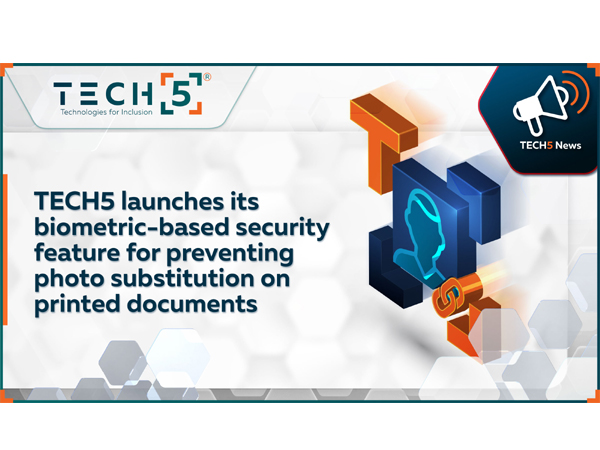
TECH5 launches its biometric-based security feature for preventing photo substitution on printed documents
TECH5, an innovator in the field of biometrics and digital identity management, launches T5-FaceLink – a biometric-based digital security feature to protect the facial image on a printed identity document from alteration or substitution. It can be used in various scenarios to increase confidence that the document is genuine and belongs to its holder without any specialized tools.
Printed ID documents have several levels of protection to prevent forgery and identity theft. Despite the sophisticated features, fraud involving identity theft is a growing problem: according to an independent financial services 2022 research report, identity fraud losses in the U.S. alone totalled $28 billion and affected 27 million consumers.
The swapping of the photograph on the document is one of the most common types of fraud, allowing the fraudster to take an existing ID document and create a new ID from it. “Fraudulent documents with swapped photos pose significant risks as they facilitate various types of illegal activities, including identity theft, financial fraud, immigration fraud, and other forms of deception.” – Says Rahul Parthe, Co-founder, Chairman and CTO of TECH5.
T5-FaceLink is a high-density code containing a biometric face representation generated from the original photo. Printed on the document alongside the photo at the stage of document personalization, it ensures that the photo on the document is the same as the one stored in the code. Verification consists of capturing the two together; the software then compares the representation in the code with another representation generated on-the-fly from the printed photo, all in real-time.
A T5-FaceLink code can also hold the digital signature to assert the genuineness of the document. “Inspired by the T5-Digital ID’s features and advantages and combining it with our identity market expertise, we developed T5-FaceLink to improve document security. It allows linking the photo on the document to the security feature, proving the authenticity using digital signature and additionally biometrically verifying the holder of the ID directly against the document (if required), unlocking additional verification capability for offline use cases.” – Comments Mr. Parthe.
The next growing problem that TECH5 addresses with T5-FaceLink is the protection of physical documents used for digital onboarding and access to online services. As such services have moved online, the fraud has morphed to take advantage of the inherent weaknesses of physical IDs, which were not designed for such use cases. “The protection of identity documents from photo substitution becomes more important with the increased use of ID documents in remote/unattended eKYC scenarios increasingly used by banks, telcos, enterprises, healthcare providers, and governments. We believe that T5-FaceLink is an answer to solving the fraud problem involving the use of documents with swapped photographs for both online and offline verification use cases.” – Comments TECH5’s Strategy Advisor Rob Haslam.
T5-FaceLink can also be used to “upgrade” existing ID documents without the need to replace documents, designs, or personalisation systems, or indeed add a chip in order to include biometrics. This enables governments to address the needs of modern ID documents without having to go through significant infrastructure replacement and cost increase.
T5-FaceLink, as part of the credential issuance offering, is available to all certified partners of TECH5 globally. The company is already providing this security feature for testing in several national-level projects in the Middle East.
